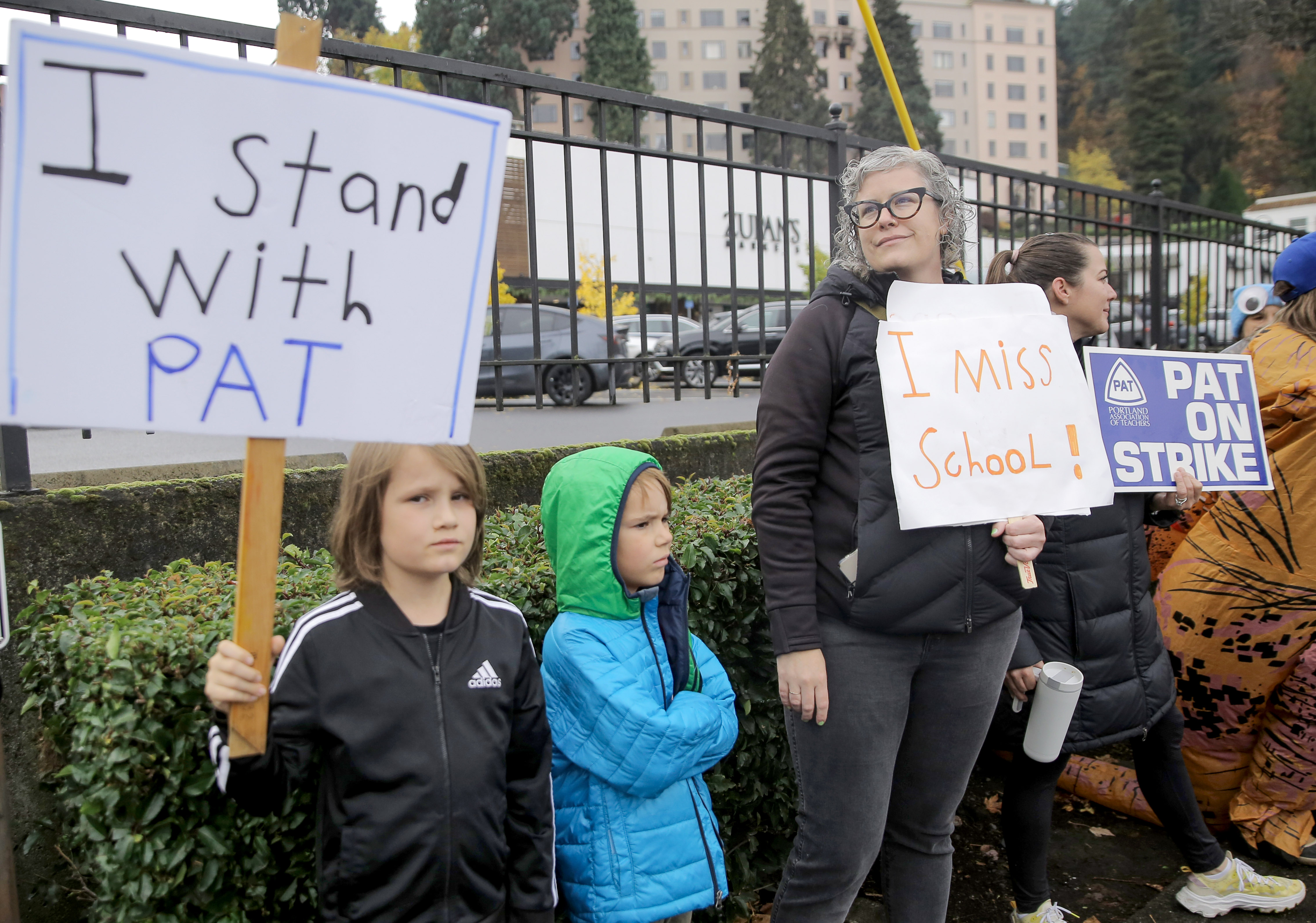
Portland Association of Teachers supporters picket near the intersection of Northwest 23rd Avenue and Burnside Street on Nov. 15, 2023, as the strike continues.
Kristian Foden-Vencil / OPB
There’s a range of emotions when it comes to how parents feel about the ongoing teachers strike in Portland Public Schools.
Thousands of educators and supporters of the strike have been on the picket lines since the start of the month. An overwhelming percentage of voting members within the teachers’ union — nearly 99% — voted to authorize the strike to begin with.
Families have often marched and chanted alongside teachers, provided snacks or attended afternoon rallies and events. Some have organized bike parades with their kids, or GoFundMe accounts to help teachers. Drivers frequently honk as they pass the picket line.
Officials with the Portland Association of Teachers said Friday that 108,000 emails have been sent to the school board supporting their cause. More than 6,200 employees and community members have signed an open, online petition created by PAT, saying they have no confidence in PPS Superintendent Guadalupe Guerrero.
But there are other feelings among parents as well.
Many support the teachers but haven’t been able to join them on the picket line. Some support them but are worried about the long-term effects on their students. Many struggle to deal with the real-life consequences of having kids unexpectedly at home during the day and find themselves using up personal time or taking unpaid leave so they can be at home.
Some parents support what the teachers are bargaining for but don’t think they should be striking to accomplish it. Others question the union’s tactics, numbers or messaging, and feel union leaders have been disingenuous with its members and the public. Some have opposed the strike from the start.
‘The kids have already paid a large enough price’
Eric Happel is one of those parents. He has three daughters who grew up in Portland Public Schools. His eldest is in college, but the other two are current high schoolers. He recognized he’s in a favorable position with older kids who can manage themselves at home independently, and because he has a hybrid job.
Happel is part of a group of parents working together since the COVID-19 pandemic to keep schools open. He said families saw firsthand during the pandemic how being out of school impacts students’ mental health and their ability to socialize. Since returning, schools nationwide are still dealing with learning loss, including low test scores and students struggling with core subjects such as math and reading.
“[We] were just starting to regain some ground in Portland Public on some of those areas,” he said, “and we go into the strike and close school for a needless month.”
@KGWNews @KOINNews @KATUNews @NataliePateGwin @jrlsilverman
— Nathan Isaacs (#QQT) (@isaacsnd) November 15, 2023
While my family is teaching our kids at home and catching up on our own jobs late into the night, PAT is hosting a kegger?
Would love to see this featured in your reporting. #GetOurKidsBackInSchool pic.twitter.com/gRMpJ4n7gS
Happel helped organize a public, online petition calling on PAT to end the strike and continue bargaining with the district while students return to class. As of Friday, the petition had garnered nearly 490 votes.
While that number is much smaller than other online actions supporting the strike, Happel said he thinks he’s part of a “silent majority” compared to the “loud minority” seen on the picket lines and heard from more often in media coverage. That may be the case, though recent polling commissioned by the statewide teachers’ union before Portland teachers went on strike indicated heavy support statewide for these actions.
Happel doesn’t entirely disagree with what the teachers are bargaining for, but he does have critiques on how it’s being done — for starters, having a strike in the middle of the school year.
Happel pointed to an Education Week article published earlier this year, showing a map of states and whether they allow school employees to strike. Oregon is one of 13 states that does. Laws vary by state. Some teachers can only strike over the summer, Happel listed as an example, or they can strike during the year but can’t close schools. A few Republican lawmakers in Oregon plan to introduce legislation to ban teacher strikes here, but it’s unlikely to get the support it would need from Democrats to pass.
Happel acknowledged much of PAT’s proposal seeks to address decades of underfunding in Oregon’s public school system, and the state needs to do more. And he agrees educators deserve to be paid more. But he said the contract deal has to be within the district’s budget reality, which he argued PAT hasn’t done.
His main concern is that kids are the ones caught in the crossfire.
His message to PAT: “Get the kids back in school. Keep having conversations. I understand that you think that you lose bargaining power when you do that, but kids should never be the point of bargaining power. And the kids have already paid a large enough price.”
For parents with similar concerns, he urged them to write letters to PAT, the school board and Gov. Tina Kotek. “Be respectful,” he said, “but be brave.”
Kara Colley was scared to speak out at the start of the strike. Colley is a former college math teacher with two kids in the district. She said she probably wouldn’t be as worried about the strike’s impact if her family hadn’t struggled so much during the pandemic. Her child was struggling with reading at the time, and then, suddenly, she recalled, there was no school.
“It was terrifying,” she spoke through tears. Colley said it was also hard on her kids when they finally returned for limited in-person hours during the pandemic. She said they were starved for time with their teachers and friends.
Now, it feels like it’s happening again. Colley said she hasn’t been able to sleep well since Nov. 1.
“I just feel completely let down by the school district and by the teachers union,” she said.
Colley’s kids have been reading in English and Spanish during the recent closures. She’s made math worksheets for them. Her daughter has practiced the guitar. Colley’s partner is a carpenter and has been working on projects with the kids when he has time. But Colley said she’s tired of hearing what parents do to keep their kids occupied.
“I believe the teachers union has really won the narrative. They have convinced parents in the city that, you know, what they want is reasonable … ‚” she said. “I didn’t feel comfortable speaking up for the first two weeks, and then it just kind of broke me.”
Part of Colley’s emotion is her connection with her kids’ teachers. She listed several by name who her family loves.
“As a parent, you … send your little person off to school, and you trust, ‘Oh, that adult’s gonna take care of them and teach them how to read.’ And they did,” she said. “And so, it’s very difficult to speak up and say, ‘What I think the teachers union is doing is not right.’ "
‘Standing up for the right things’
Many parents think the union’s requests are fair. They feel the union is finally asking for things parents have been demanding for years. And they don’t think they can ask teachers to go back to a way of working that was “unacceptable and unsustainable.”
Several parents contacted OPB this week about issues like class sizes and inadequate special education resources.
Parent Janelle Parish has seen the challenges firsthand as a volunteer at her son’s school. She said it’s really difficult for teachers to help kids who’ve fallen behind when so many students have to catch up. She acknowledged the difficult conditions inside poorly maintained classrooms at her son’s school, where temperatures may range from the low 50s to nearly 100. “He had a test in a 93-degree classroom,” Parish said.

Cara Jamison, left, and her daughter Hailey Moore, 8, attend the Portland Association of Teachers rally held at Roosevelt High School in Portland, Ore., Nov. 1, 2023. “Seeing what the teachers are dealing with in the classroom, in school, how much they’re doing for the students — I know how much it affects my daughter and she values them. I think it’s important to show support,” says Cara Jamison. Hailey attends Sitton Elementary School and adds, “I think it’s really important to help support our teachers and get what we need and get what our teachers need to help us learn.”
Tiffany Camhi / OPB
Parent Ashley Schofield said the closures have been difficult for parents, and she knows a lot of folks are running out of child care options. But she doesn’t think the momentum behind the union’s effort is gone.
“We believe our teachers are standing up for the right things, and we hope that PPS ends their tactics of what feels like fear-mongering, and start proving they also believe we need safe and healthy classrooms and quality education, which includes putting teachers first,” Schofield told OPB. “It’s nonsense how PPS is blaming PAT and teachers for all the things they have ignored over the last decade.”
She said families can’t always make it to the picket line, but they’re still out there, supporting those on strike. “We are holding down the forts at home so our teachers can keep fighting for what we all know is right.”
Students have been out of school for more than two weeks and won’t return at this point before Nov. 27. As of Friday, bargaining teams from both sides seem optimistic that they’re finally making progress.



